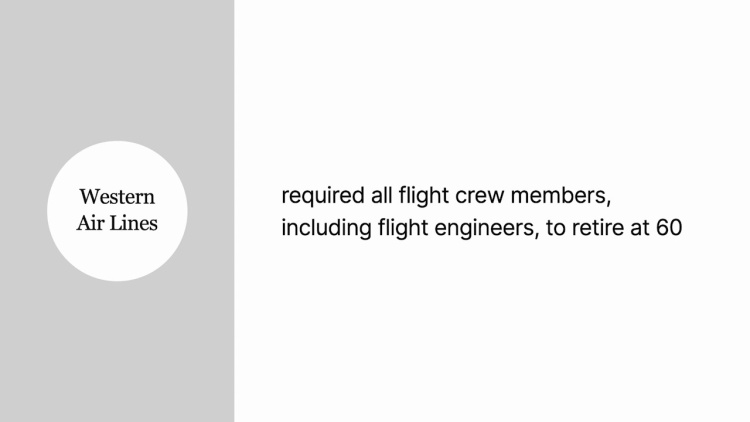Western Air Lines, Inc. v. Criswell
United States Supreme Court
472 U.S. 400 (1985)
- Written by Abby Roughton, JD
Facts
A Federal Aviation Administration (FAA) regulation required commercial pilots and first officers to retire at age 60. However, the FAA had no mandatory retirement age for cockpit flight engineers. Despite the lack of an FAA regulation, Western Air Lines, Inc. (Western) (defendant) required its flight engineers to retire at age 60. Charles Criswell, Albert Ron, and Rulon Starley (plaintiffs) were forced to retire at age 60 based on Western’s policy. Criswell, Ron, and Starley sued Western, alleging that Western’s mandatory-retirement policy violated the Age Discrimination in Employment Act (ADEA) provision prohibiting mandatory retirement before age 70. Western asserted that its policy did not violate the ADEA because age was a bona fide occupational qualification (BFOQ). At trial, the evidence indicated that it was feasible to conduct individual medical examinations of flight-crew members over age 60 to determine if they were physically qualified to fly and that other large commercial airlines permitted flight engineers over age 60 to fly with no reduction in the airlines’ safety records. The trial court instructed the jury that Western was entitled to the BFOQ defense only if the mandatory-retirement policy was reasonably necessary to the essence of Western’s business, which the court defined as safely transporting passengers. The jury found for Criswell, Ron, and Starley, and the appellate court affirmed. The United States Supreme Court granted certiorari.
Rule of Law
Issue
Holding and Reasoning (Stevens, J.)
What to do next…
Here's why 907,000 law students have relied on our case briefs:
- Written by law professors and practitioners, not other law students. 47,100 briefs, keyed to 996 casebooks. Top-notch customer support.
- The right amount of information, includes the facts, issues, rule of law, holding and reasoning, and any concurrences and dissents.
- Access in your classes, works on your mobile and tablet. Massive library of related video lessons and high quality multiple-choice questions.
- Easy to use, uniform format for every case brief. Written in plain English, not in legalese. Our briefs summarize and simplify; they don’t just repeat the court’s language.





